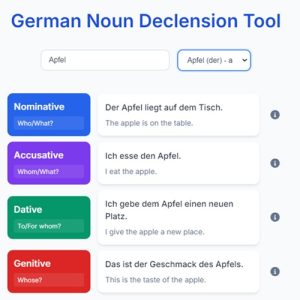Practice the Nominative Case in German
Learning German articles can be tricky, especially when you’re trying to master when to use der, die, or das. That’s why we created this interactive tool — to help you get a feel for sentence structure and gain confidence with the nominative case, one of the most essential parts of German grammar.

What is the Nominative Case?
In German, the nominative case is used for the subject of a sentence — the person or thing doing the action. It answers the question “Who or what is doing something?”
Here are a few simple examples:
- Der Hund bellt. (The dog barks.)
- Das Mädchen rennt. (The girl runs.)
- Die Sonne scheint. (The sun shines.)
Notice how the articles change depending on the gender of the noun:
- Masculine → der
- Feminine → die
- Neuter → das
This is what you’ll be practicing in the tool below.
How to Use This Tool
- Read the English sentence at the top.
- Below it, you’ll see a group of German words in random order — including some “distractor” words to make it a bit more fun.
- Click the correct words in order to build the German translation.
- When you’re done, click Check Answer to see if you’re right.
- You’ll get immediate feedback, including the option to ask for a clue to the next word.
- Click Next to try a new sentence.
- Keep going and watch your score grow!
This is a great way to reinforce the basics while getting used to common sentence structures in German.
Nominative Case Practice Tool
Keep Practicing!
The nominative case is the foundation of German grammar. Once you’re comfortable with it, you’ll find it much easier to move on to the accusative and dative cases.
Bookmark this page and come back any time you want to reinforce your basics. We’ll keep adding new sentences to keep things fresh and fun!
Try our Declension Tool to deepen your understanding
What Are German Dative Verbs?
German dative verbs are verbs that require their objects to be in the dative case,
like helfen (to help) or danken (to thank). Mastering these
German dative verbs is essential for speaking natural German. Read More…
Boost Your German Skills with These Recommended Resources!
Enhance your learning journey with carefully selected German language tools and books. These resources are perfect companions to the Der vs. Die vs. Das game, ensuring you master German articles quickly and confidently!
- German Grammar Drills
Improve your grammar effortlessly with clear explanations and practice exercises. - Pimsleur Conversational German
Develop fluency and perfect pronunciation through interactive audio lessons. - 501 German Verbs (Barron’s)
Conquer German verb conjugations and gain confidence in speaking and writing.
Clicking and purchasing through these links supports our site and helps us continue creating fun, effective learning experiences without any cost to you—Danke schön!
Try Our Other German Learning Games
Now that you’ve had a blast with our crosswords, why not try our other games to boost your German skills even more? Explore additional challenges, expand your vocabulary, and enjoy every step of your language journey!
Practice the Nominative Case in German
The dog barks. – Der Hund bellt.
The boy sleeps. – Der Junge schläft.
The girl runs. – Das Mädchen rennt.
The teacher smiles. – Die Lehrerin lächelt.
The baby cries. – Das Baby weint.
The sun shines. – Die Sonne scheint.
The moon is full. – Der Mond ist voll.
The cat is cute. – Die Katze ist süß.
The man is tall. – Der Mann ist groß.
The woman laughs. – Die Frau lacht.
The clock ticks. – Die Uhr tickt.
The bird sings. – Der Vogel singt.
The car is fast. – Das Auto ist schnell.
The train arrives. – Der Zug kommt an.
The plane is late. – Das Flugzeug hat Verspätung.
The door is open. – Die Tür ist offen.
The window is clean. – Das Fenster ist sauber.
The chair is broken. – Der Stuhl ist kaputt.
The computer is slow. – Der Computer ist langsam.
The book is interesting. – Das Buch ist interessant.
The phone rings. – Das Telefon klingelt.
The fish swims. – Der Fisch schwimmt.
The cow is big. – Die Kuh ist groß.
The horse runs. – Das Pferd läuft.
The sheep is white. – Das Schaf ist weiß.
The lion roars. – Der Löwe brüllt.
The elephant is huge. – Der Elefant ist riesig.
The turtle is slow. – Die Schildkröte ist langsam.
The mouse is small. – Die Maus ist klein.
The snake hisses. – Die Schlange zischt.
The apple is red. – Der Apfel ist rot.
The banana is yellow. – Die Banane ist gelb.
The bread is fresh. – Das Brot ist frisch.
The soup is hot. – Die Suppe ist heiß.
The water is cold. – Das Wasser ist kalt.
The coffee is strong. – Der Kaffee ist stark.
The tea is warm. – Der Tee ist warm.
The pizza is tasty. – Die Pizza ist lecker.
The cheese is soft. – Der Käse ist weich.
The cake is sweet. – Der Kuchen ist süß.
The tree is tall. – Der Baum ist groß.
The flower is beautiful. – Die Blume ist schön.
The grass is green. – Das Gras ist grün.
The sky is blue. – Der Himmel ist blau.
The cloud is white. – Die Wolke ist weiß.
The star is bright. – Der Stern ist hell.
The snow is cold. – Der Schnee ist kalt.
The wind is strong. – Der Wind ist stark.
The rain is heavy. – Der Regen ist stark.
The ice is slippery. – Das Eis ist glitschig.
The fire is hot. – Das Feuer ist heiß.
The light is on. – Das Licht ist an.
The shadow is long. – Der Schatten ist lang.
The city is big. – Die Stadt ist groß.
The village is small. – Das Dorf ist klein.
The house is old. – Das Haus ist alt.
The apartment is modern. – Die Wohnung ist modern.
The street is empty. – Die Straße ist leer.
The park is quiet. – Der Park ist ruhig.
The playground is fun. – Der Spielplatz ist lustig.
The school is closed. – Die Schule ist geschlossen.
The shop is open. – Der Laden ist geöffnet.
The restaurant is busy. – Im Restaurant ist viel los.
The hotel is expensive. – Das Hotel ist teuer.
The bus is full. – Der Bus ist voll.
The bike is new. – Das Fahrrad ist neu.
The road is long. – Die Straße ist lang.
The bridge is high. – Die Brücke ist hoch.
The river is wide. – Der Fluss ist breit.
The lake is deep. – Der See ist tief.
The ocean is calm. – Der Ozean ist ruhig.
The mountain is tall. – Der Berg ist hoch.
The valley is green. – Das Tal ist grün.
The island is remote. – Die Insel ist abgelegen.
The desert is hot. – Die Wüste ist heiß.
The forest is dark. – Der Wald ist dunkel.
The jungle is loud. – Der Dschungel ist laut.
The beach is sandy. – Der Strand ist sandig.
The student is smart. – Der Student ist klug.
The doctor is kind. – Der Arzt ist freundlich.
The pilot is ready. – Der Pilot ist bereit.
The actor is famous. – Der Schauspieler ist berühmt.
The singer is loud. – Der Sänger ist laut.
The artist is creative. – Der Künstler ist kreativ.
The chef is busy. – Der Chefkoch ist fleißig.
The waiter is friendly. – Der Kellner ist freundlich.
The guard is tired. – Der Wachmann ist müde.
The soldier is brave. – Der Soldat ist mutig.
The police officer is alert. – Der Polizist ist wachsam.
The firefighter is strong. – Der Feuerwehrmann ist stark.
The engineer is clever. – Der Ingenieur ist klug.
The scientist is curious. – Der Wissenschaftler ist neugierig.
The astronaut is trained. – Der Astronaut ist trainiert.
The king is powerful. – Der König ist mächtig.
The queen is elegant. – Die Königin ist elegant.
The prince is young. – Der Prinz ist jung.
The princess is lovely. – Die Prinzessin ist schön.
The hero is here. – Der Held ist hier.
The villain is gone. – Der Bösewicht ist weg.
The robot is working. – Der Roboter ist in Betrieb.
The computer is off. – Der Computer ist ausgeschaltet.
The clock is ticking. – Die Uhr tickt
